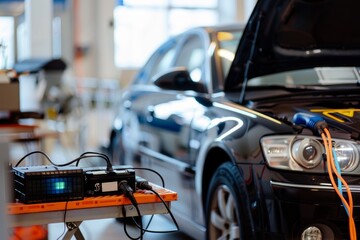
How to Prepare Your Vehicle for a Long Road Trip

A long road trip can be a thrilling adventure, but it’s essential to ensure your vehicle is ready for the journey ahead. Proper preparation not only prevents unexpected breakdowns but also enhances your safety and peace of mind. Here’s a comprehensive guide to getting your car road-trip-ready.
1. Inspect Your Tires
Tires are your car’s connection to the road, and their condition is critical for safety and fuel efficiency.
- Check Tread Depth: Use the penny test to ensure your tires have adequate tread. Insert a penny into the tread with Lincoln’s head upside down. If you can see the top of his head, it’s time to replace the tire.
- Inspect for Damage: Look for cuts, cracks, or bulges on the sidewalls.
- Check Tire Pressure: Inflate your tires to the manufacturer’s recommended pressure (found in your owner’s manual or on the driver’s door frame). Don’t forget the spare tire!
2. Test and Replace Fluids
Fluids keep your car’s systems running smoothly, so check and top off these critical ones:
- Engine Oil: Check the oil level and quality using the dipstick. If it’s dark or dirty, schedule an oil change.
- Coolant: Inspect the coolant level and top it off if needed. This prevents overheating.
- Brake Fluid: Ensure your brake fluid is at the proper level and hasn’t darkened, which could indicate it’s time for a flush.
- Windshield Washer Fluid: A clear windshield is vital for visibility, especially on long drives.
- Transmission Fluid: Ensure it’s at the correct level and in good condition.
3. Inspect Brakes and Suspension
Your brakes and suspension play a critical role in safety, especially on winding roads or during sudden stops.
- Listen for squeaking or grinding noises, which may indicate worn brake pads.
- Have a professional inspect the brake rotors and suspension components for wear and tear.
4. Test Your Battery
A dead battery can leave you stranded, so test its voltage or visit a repair shop to have it checked.

- Ensure the battery terminals are clean and free of corrosion.
- Look for signs of wear, like cracks in the casing or leaks.
If your battery is over three years old, consider replacing it as a precaution.
5. Inspect Lights and Wipers
Driving at night or in bad weather requires optimal visibility.
- Test all your lights, including headlights, brake lights, and turn signals. Replace any burned-out bulbs.
- Check your windshield wipers for cracks or streaking. If they don’t clear the windshield effectively, replace them.
6. Pack an Emergency Kit
Even the best-prepared traveler can face unexpected challenges. Pack an emergency kit that includes:
- Jumper cables or a portable jump starter.
- A first-aid kit.
- A flashlight with extra batteries.
- Basic tools like a wrench, screwdriver, and pliers.
- A tire repair kit and portable air compressor.
- Blankets, water, and non-perishable snacks.
- A phone charger or power bank.
7. Plan Your Route and Stops
Knowing where you’re going and planning stops along the way can reduce stress and help your car.
- Use navigation tools to map out your route, noting fuel stations and rest stops.
- Schedule breaks every 2-3 hours to stretch and check your car for any signs of trouble.
8. Check Your Documents
Ensure you have all the necessary paperwork in case of an emergency or checkpoint.
- Vehicle registration and insurance documents.
- Your driver’s license.
- A copy of your car’s owner’s manual for troubleshooting.
9. Clean and Organize Your Car
A clean car makes the journey more pleasant.
- Vacuum the interior and clean windows for better visibility.
- Organize essentials like snacks, maps, and chargers within easy reach.
10. Perform a Test Drive
A few days before your trip, take your car for a test drive to identify any potential issues. Pay attention to how it handles, unusual noises, or dashboard warning lights.
Bonus Tips for Road-Trip Comfort
- Fuel Up Wisely: Avoid letting your tank drop below a quarter full to prevent debris from the bottom of the tank clogging your fuel line.
- Stay Charged: Keep a portable charger for electronic devices.
- Check the Weather: Be prepared for changing conditions along your route.
Conclusion
Preparing your vehicle for a long road trip takes time, but it’s well worth the effort. A well-maintained car ensures a smoother, safer, and more enjoyable journey. With these steps, you can hit the road with confidence, ready to create unforgettable memories.
Safe travels!
Share :

LeClaire Auto Repair provides trusted auto repair services to keep your car running smoothly. With expert care and helpful advice, we’re here for all your maintenance needs. Follow us for tips and updates!

LeClaire Auto Repair provides trusted auto repair services to keep your car running smoothly. With expert care and helpful advice, we’re here for all your maintenance needs. Follow us for tips and updates!
Latest Post


Winter Car Care: Protecting Your Vehicle in Cold Weather

Top Reasons Your Check Engine Light Might Be On

